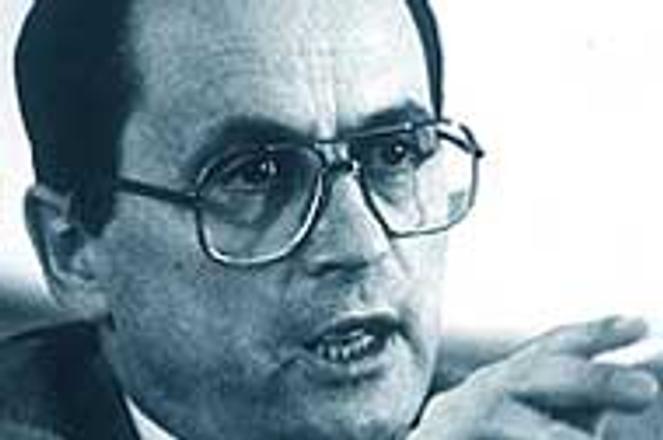Ján Čarnogurskýphoto: Pavel Majer
One of Slovakia's least popular politicians, Justice Minister Ján Čarnogurský, announced last weekend that he would not run again for the chairmanship of his party, the Christian Democratic Movement (KDH). Addressing a silent press conference on June 4, Čarnogurský needed only two minutes to read his statement, after which he simply stood up and left - closing the door on a colourful chapter in the country's political life.
The departure of a man whose party enjoys barely 3% voter support would not merit more than brief comment execpt for one reason: Čarnogurský's rise, fall and self-effacement proves how much Slovakia's political scene has matured in the past decade.
A lawyer by profession, Čarnogurský was always at his best when defying someone or something. He spent several months in jail under the communists for sedition, earning moral credit that put him at the fore of the Government of National Unity in 1989, and that kept him at the helm of the Christian Democrats since their founding in 1990.
Some of his best years in politics (apart from serving as Premier from 1991 to 1992) were spent as the unofficial leader of the parliamentary opposition to then-Prime Minister Vladimír Mečiar from 1994 to 1998. Using his spotless reputation as a Christian and a democrat, Čarnogurský took the pugnacious PM to task on many occasions; when, in 1996, he asked Mečiar where he had been on the night of the Kováč Jr. kidnapping, he received the reply: "Ask your wife." He was called a "traitor" in 1997 by then-Parliamentary Foreign Affairs Committee boss Dušan Sloboník for signing a pre-electoral cooperation agreement with the Slovak Hungarian parties, and was even accused of fomenting an assasination plot against Mečiar by the irascible PM himself.
But Čarnogurský's defiant streak in the end may have done him in, leaving him out of step with the maturing democracy he helped to found. Always more of a Russophile than a booster of westward-looking policies, he said in 1997 that Slovakia should be "restrained" in its approach to NATO - a statement which drew from Mečiar the response "that's the first of Čarnogurský's opinions I've ever agreed with." A stout defender of Christendom, he said the church should do battle with liberalism "in the interest of real human values."
Later, in November 1998, he voted in parliament against his own government's programme because it did not contain enough of the Christian Democrats' demands. He defied Prime Minister Mikuláš Dzurinda at every step because the latter wanted to submerge the KDH within the larger embrace of the Slovak Democratic Coalition. As Justice Minister he expressed the opinion that if ex-Prime Minister Mečiar was found guilty of having committed crimes while in office, he should be pardoned.
In his words and demeanour, Čarnogurský simply followed the same independent hard line under Dzurinda he had taken against the country's communists and quasi-democrats. But in Slovakia at the turn of the millenium, flipping the bird at those in charge is less of a vote-getter than it used to be, especially since the authorities no longer kidnap the country's citizens or steal their privatisation treasures. And flouting NATO and the liberal values society espouses takes a heavy toll among Slovakia's increasingly discerning electorate.
In other ways, too, Čarnogurský failed to adjust to political change in Slovakia. With analysts saying this year that the trend was towards unification of parties rather than fragmentation (in 1998, almost 100 movements and parties were registered with the Interior Ministry), Čarnogurský chose to defend his beloved KDH against absorption by Dzurinda's new 'centre-right' SDKÚ. With society and the media enamoured of the West and in an uproar over government corruption, Čarnogurský became personally involved in lobbying to have certain parties given the job of settling Russia's debt to Slovakia. And at a time when the economy became the issue of the day, Čarnogurský appeared to know little and care less about business and integration, meaning he had little to add to most public political discussions.
But if Čarnogurský's story is that of an aging dissident out of step with the times, it is also that of a decent, kindly old stick who always gave the impression of absolute rectitude. Upright he remained to the last (even his Russian lobbying had something open-handed about it), choosing to step down from his post rather than drag his party lower in the polls. With that gesture, too, Čarnogurský showed how little he has in common with the country's more modern politicians, most of whom would chain themselves to the chairmanship rather than do the honourable (SDĽ leader Jozef Migaš comes to mind).
Slovak politics has indeed matured further than Čarnogurský was able or willing to, but not every change has been for the better. Nor, it should be said, has everyone who marched to his own drummer necessarily been out of step.


